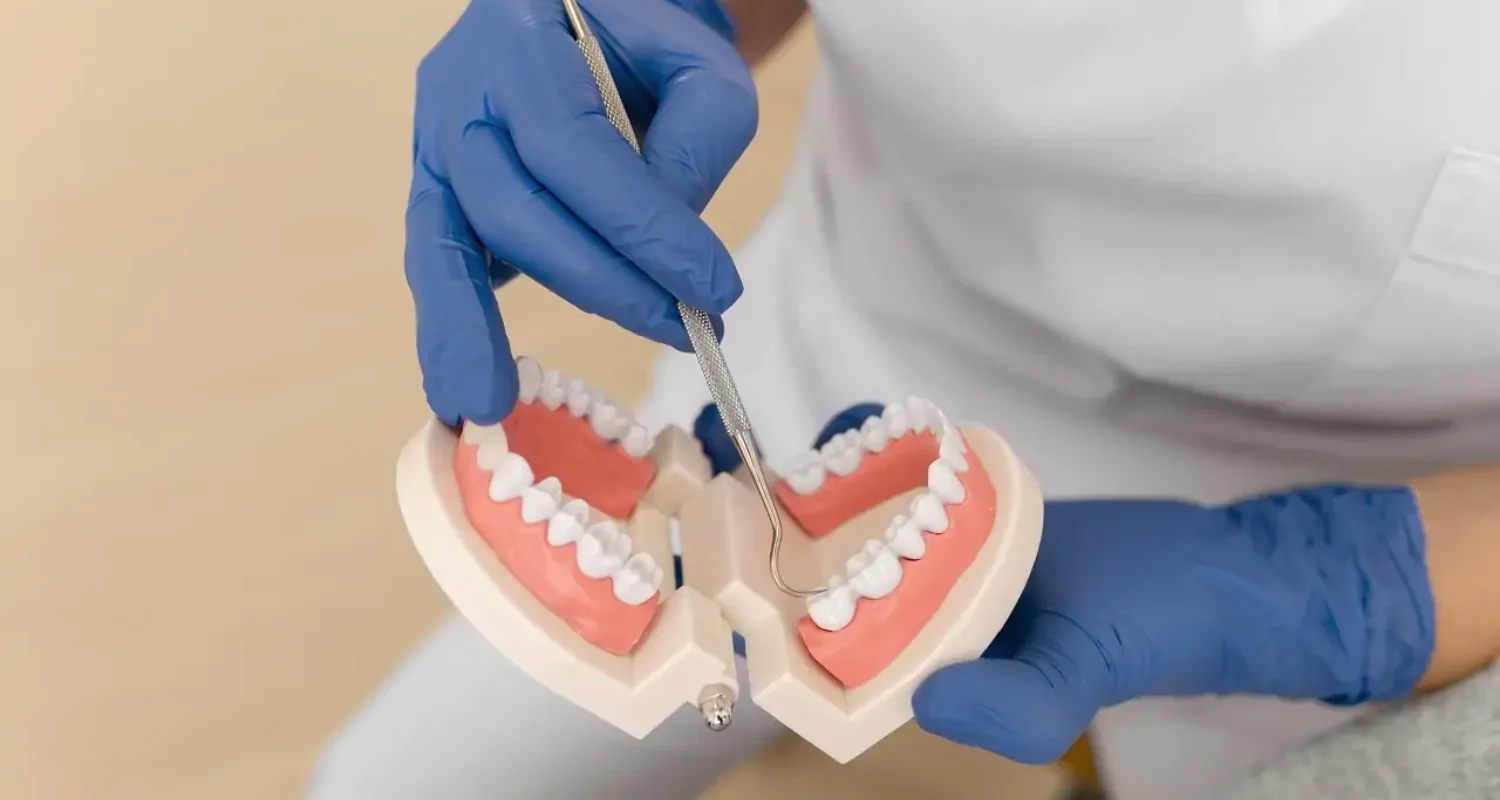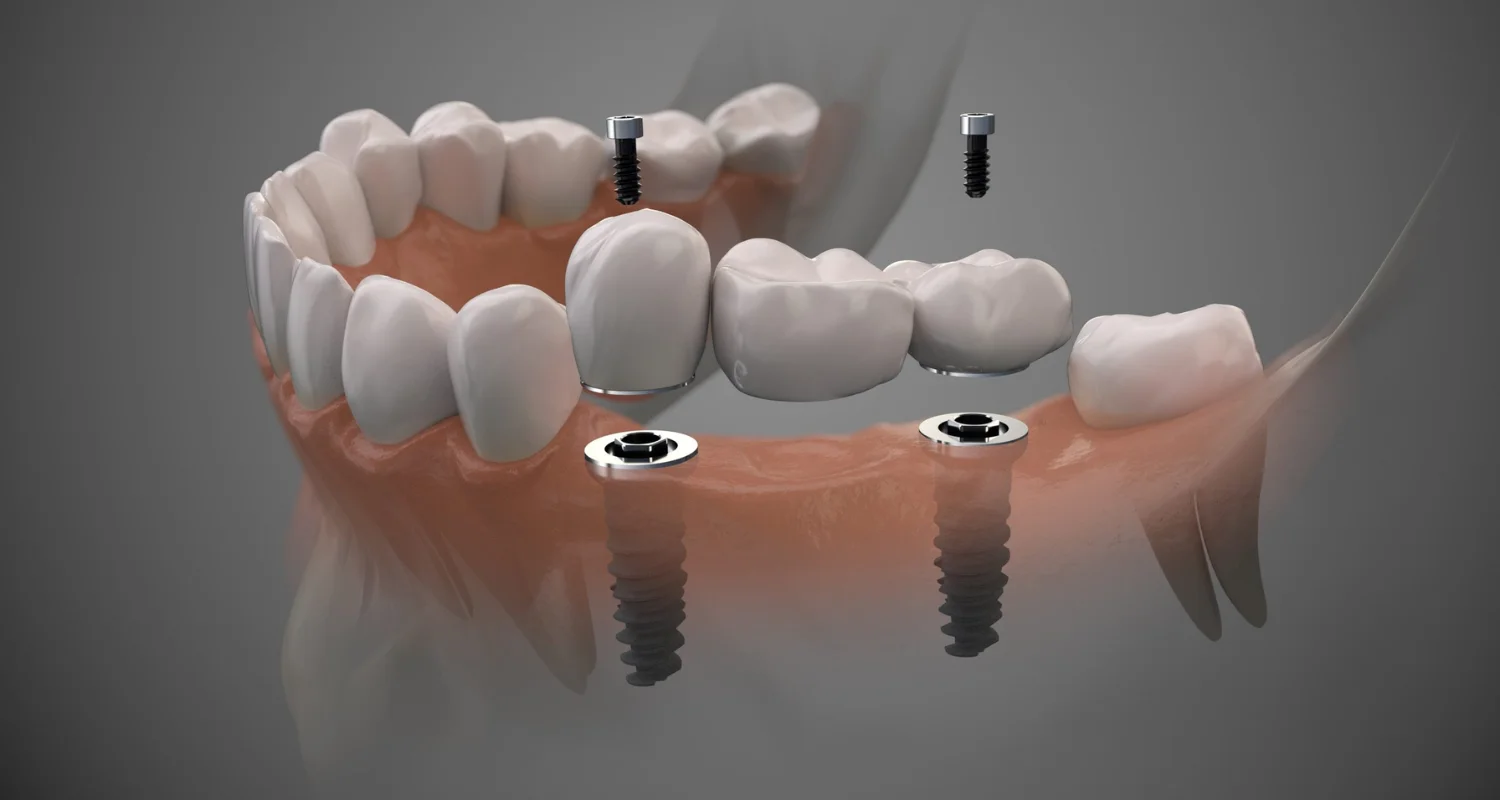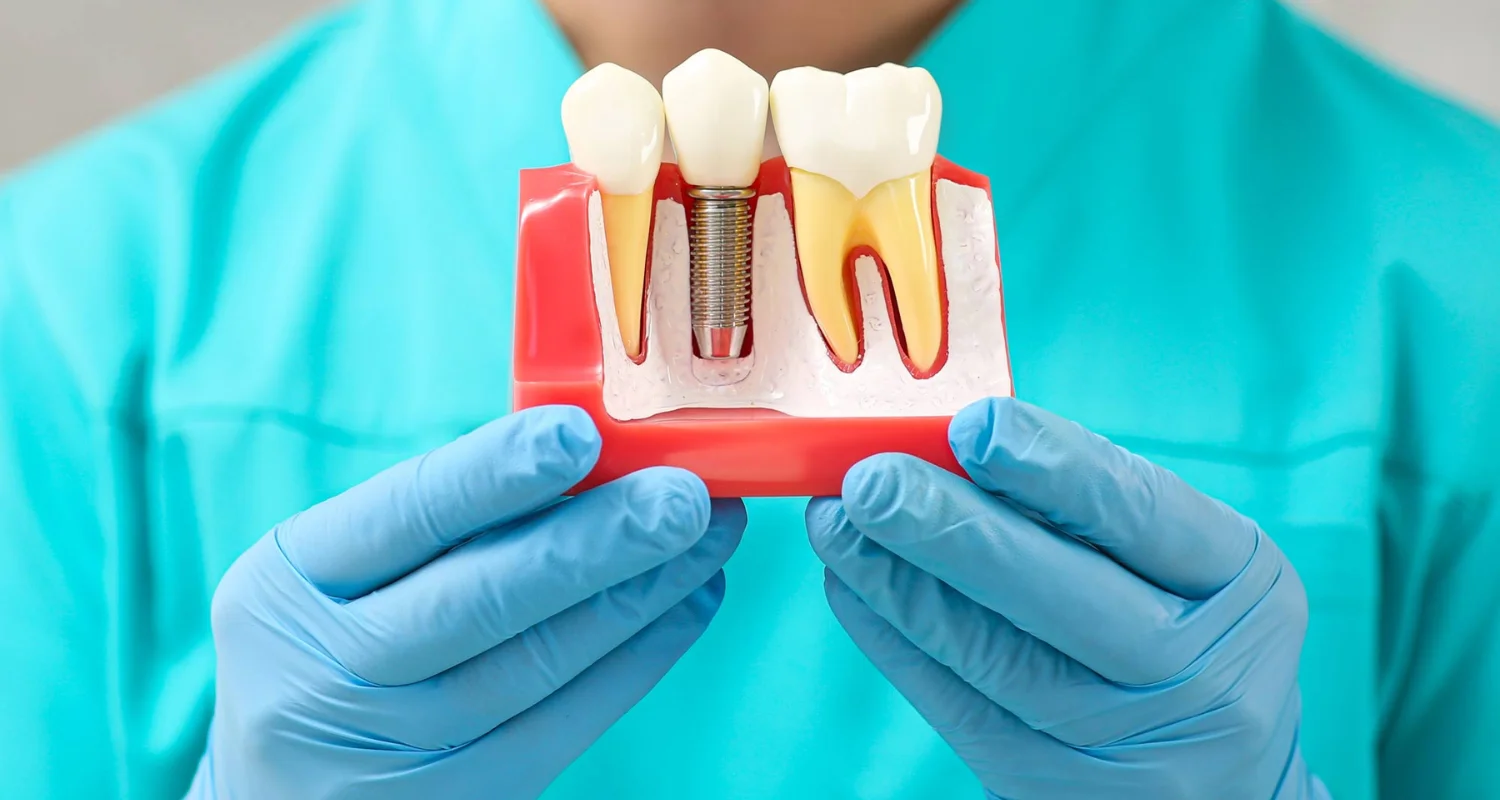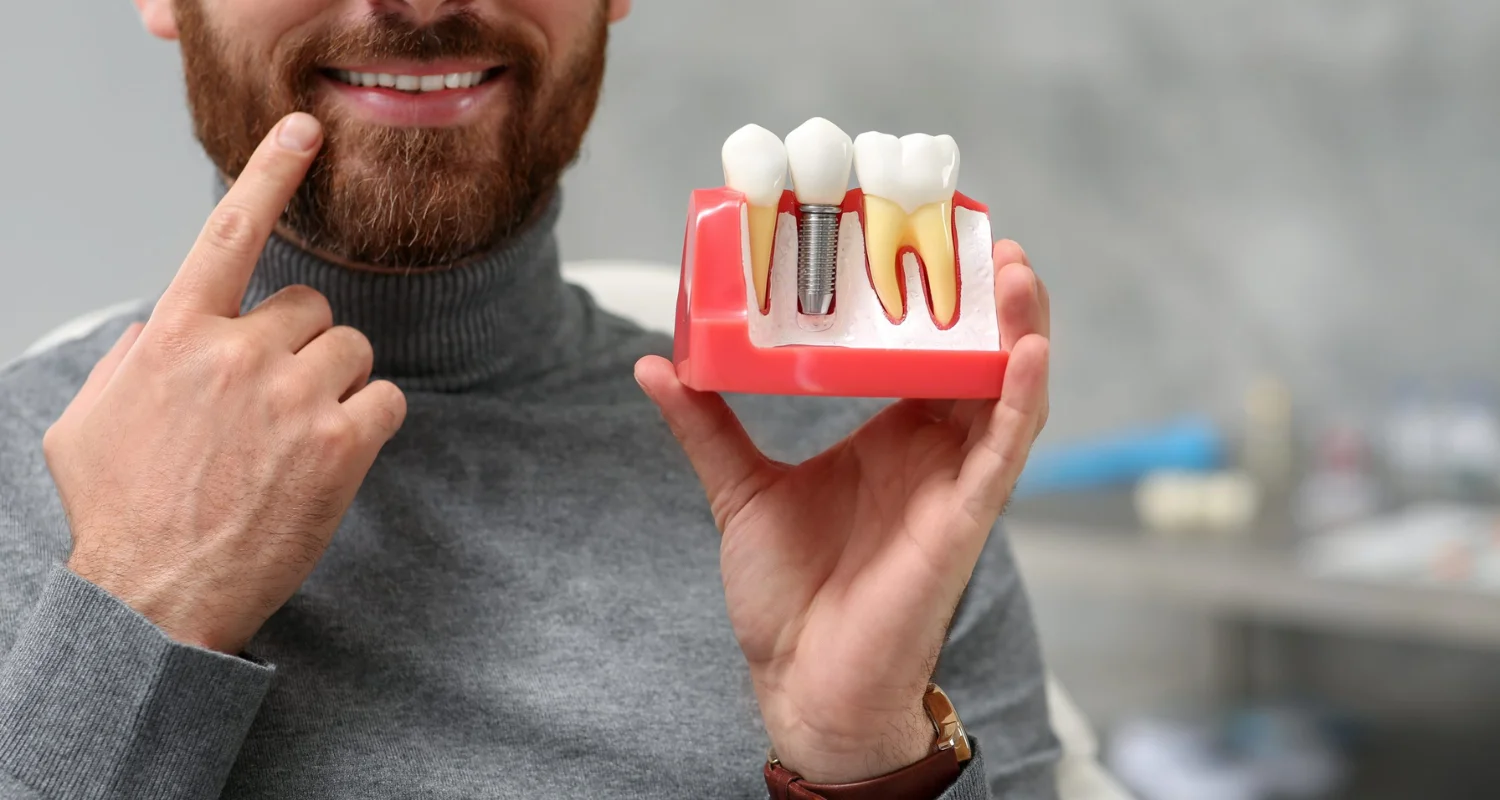Last Updated on: 19th September 2025, 12:32 pm
Getting dental implants for missing teeth is a significant step toward restoring a confident and functional smile. However, the success of the procedure largely depends on proper post-operative care and healing. Following the right aftercare steps can speed up recovery, prevent complications, and ensure the longevity of your implants. This comprehensive guide will walk you through the crucial aspects of aftercare for dental implants, including how long pain lasts, best recovery practices, foods to avoid, and when to contact your dentist.
How long does the pain last after dental implants?
It is normal to experience some degree of pain, swelling, and discomfort after dental implant surgery. However, understanding the healing timeline can help you manage expectations and take the right steps to support recovery.
Pain timeline after dental implant surgery:
● Day 1-3: This is when pain, swelling, and slight bleeding peak. The surgical site may feel tender, and you might experience discomfort when talking, chewing, or drinking.
● Day 4-7: Pain should gradually decrease, and swelling should begin to subside. Some tenderness may persist, but overall discomfort should be manageable with pain relief measures.
● Week 2: By this stage, most pain should be gone. However, the implant site may still feel slightly sensitive, especially when brushing or eating.
● After 1 month: Healing continues beneath the gumline, but pain or discomfort should not be noticeable.
Signs of normal healing vs. when to worry
● Normal healing signs:
-Mild swelling and tenderness
-Slight bleeding for the first 48 hours
-Gradual reduction in pain after the first few days
● Warning signs that require a dental visit:
-Severe pain that persists beyond a week
-Excessive bleeding that does not subside after 48 hours
-Presence of pus or a foul taste in the mouth
-Fever or increasing swelling, which may indicate infection
Best practices for aftercare for dental implants
Proper aftercare plays a crucial role in ensuring that the different types of implants integrate successfully with the bone, which eventually contributes to long-term oral health. Follow these essential steps:
1. Follow your dentist’s instructions
Every patient’s case is unique, and your dentist will provide specific post-surgical guidelines based on your procedure. Adhering to these instructions is very important to avoid complications and promote healing.
2. Manage pain and swelling
-Take prescribed pain medication or over-the-counter pain relievers such as ibuprofen or acetaminophen as directed.
-Apply an ice pack on the outside of your face near the surgical site for the first 24-48 hours (20 minutes on, 20 minutes off) to reduce swelling.
-Avoid hot foods and drinks that can irritate the surgical site.
3. Keep the surgical site clean
-Do not brush the implant site for the first 24 hours to prevent irritation.
-After 24 hours, gently brush around the area using a soft-bristled toothbrush.
-A huge part of aftercare for dental implants is maintaining good oral hygiene. If you need a soft-bristled toothbrush or some special product for aftercare for dental implants, take a look at our recommendations.
-Rinse your mouth with warm saltwater (1 teaspoon of salt in a cup of warm water) 2-3 times a day, especially after meals, to keep the area clean and reduce infection risk.
4. Stay hydrated but avoid straws
-Drink plenty of water to aid healing and flush out any toxins.
-Avoid using straws for at least a week, as the suction motion can dislodge blood clots and interfere with healing.
5. Get plenty of rest
-Rest is essential for healing. Avoid strenuous activities for at least 48-72 hours after surgery.
-Keep your head elevated with extra pillows when sleeping to minimize swelling.
Aftercare for dental implants: what not to do
Certain habits can delay healing or cause complications. Be mindful of these common mistakes:
1. Don’t touch or poke the implant area
-Avoid using your tongue or fingers to feel the implant site, as this can introduce harmful bacteria and disrupt healing.
-Do not wear any dentures that cover the affected area unless specifically advised by your dentist, as they can put pressure on the implant and hinder healing.
2. Don’t rinse too vigorously
-Swishing too hard can dislodge blood clots, leading to delayed healing or dry sockets.
-Instead, gently swish salt water and let it flow out naturally.
3. Don’t exercise too soon
-High-impact activities like running, weightlifting, or contact sports can increase swelling and bleeding.
-Wait at least 48 hours before resuming moderate exercise and gradually ease back into physical activity.
4. Don’t eat crunchy, hard, or sticky foods
Certain foods can damage the implant site or cause irritation. Avoid
–Hard foods: Nuts, chips, raw vegetables
–Crunchy foods: Popcorn, toasted bread
–Sticky foods: Chewing gum, caramel
–Spicy foods: Hot peppers, salsa
–Acidic foods: Citrus fruits, tomatoes
–Hot beverages: Coffee, tea (at least for the first few days)
5. Avoid smoking and alcohol
–Smoking: Delays healing, increases infection risk, and raises the chances of implant failure by almost 59%, as suggested by recent studies.
–Alcohol: Can interfere with medications and slow down the healing process. Avoid alcohol for at least a week post-surgery.
When to see a dentist after dental implants
While most patients experience a smooth recovery, certain symptoms may indicate complications that require immediate dental attention. Knowing when to seek help can prevent minor issues from becoming serious problems.
● Persistent or severe pain
-It is normal to feel some discomfort after surgery, but any pain should gradually subside within the first week.
-If pain worsens or remains intense after 7-10 days, it could signal an infection, nerve irritation, or implant failure. Seek professional evaluation as soon as possible.
● Excessive bleeding after 48 hours
-Some bleeding is expected in the first 24-48 hours, but persistent or heavy bleeding beyond this period is not normal.
-If you notice prolonged bleeding despite applying gentle pressure with gauze, contact your dentist promptly.
● Signs of infection
-Symptoms such as increasing swelling, pus discharge, redness around the implant, fever, or a foul taste in the mouth may indicate an infection. This is called peri-implantitis.
-Untreated infections can lead to implant failure or more severe health complications.
● Loose or shifting implant
-A properly placed dental implant should feel secure. However, if you notice movement, shifting, or instability, it may be a sign of failed osseointegration (the bone not bonding properly with the implant).
-Early detection can help prevent the need for implant removal or additional procedures.
● Gum recession or bone loss
-If the gums around your implant start pulling back, exposing more of the implant structure; it may indicate gum disease, poor healing, or implant failure.
-Early treatment can help protect the surrounding bone and prevent further complications.
● Difficulty chewing or persistent discomfort when eating
-Some sensitivity while eating soft foods is normal in the early days. If you experience pain or an unusual sensation while chewing weeks after surgery, it could indicate an issue with the implant’s integration.
-Contact your dentist for an assessment to ensure everything is healing as expected.
● Swelling or bruising that worsens over time
-While mild swelling and bruising are part of the healing process, they should gradually decrease after the first few days.
-If swelling worsens instead of improving, it could signal an infection or improper healing.
● Unpleasant odor or taste
-A persistent bad taste or foul odor in your mouth, even with proper oral hygiene, can be a sign of infection or food particles getting trapped around the implant.
-Proper cleaning and a dental check-up can prevent further issues.
● Incision line opening
-One of the most common complications following an implant procedure is the reopening of the tissue surrounding the implant site.
-If your incision reopens, you may feel pain or irritation at the site.
-Your oral surgeon may instruct you to rinse your mouth with a chlorhexidine rinse or prescribe an antibiotic to prevent infection.
-If the pain does not lessen or the wound does not heal, you may need additional care.
If you’re experiencing problems even with the correct aftercare for dental implants, talk to a dentist. Here you can make an online consultation.
Tips for long-term implant success
To ensure the longevity of your dental implant after it has fully integrated with your bone and been restored with a crown, follow these essential care practices:
1. Regular dental check-ups: Visit your dentist every three months during the first year and every six months thereafter to monitor implant health.
2. Optimal oral hygiene: As a part of aftercare for dental implants, use interdental floss or super floss to clean around the implant or implant-retained dentures. A water flosser with 0.06% chlorhexidine also improves plaque control and supports peri-implant tissue health.
3. Implant-safe toothpaste: Consider using a toothpaste containing triclosan, as it may help maintain the health of the tissues surrounding the implant.
Consistent care and professional monitoring are key to ensuring your implant remains strong and functional for years to come.
Conclusion
Proper aftercare for dental implants is the key to a smooth recovery and their long-term success. By following best practices—managing pain, maintaining oral hygiene, eating soft foods, and avoiding harmful habits—you can ensure optimal healing. Be vigilant about warning signs, and do not hesitate to contact your dentist if you experience severe pain, prolonged bleeding, or signs of infection. With the right care, your dental implants will integrate successfully, providing a strong and lasting foundation for your new and transformed smile.
Frequently Asked Questions
How long does it take for a dental implant to heal?
Healing after a dental implant occurs in stages. The gum tissue usually heals within 1 to 2 weeks, while osseointegration—the process of the implant fusing with the jawbone—takes 3 to 6 months. Factors like overall health, bone quality, and lifestyle habits (such as smoking) can affect healing time. Proper oral hygiene and regular dental check-ups are essential to ensure successful integration before placing the final crown or prosthetic tooth.
Can I smoke after a dental implant?
Smoking greatly increases the risk of implant failure by slowing healing, reducing blood flow, and raising the chances of infection or peri-implantitis (gum inflammation and bone loss). To ensure success, avoid smoking for at least 2–3 months after surgery, though quitting completely is ideal for long-term implant health. If stopping is difficult, consider nicotine alternatives and maintain excellent oral hygiene with regular dental check-ups to reduce risks.
What if my implant still feels numb after surgery?
It is normal to experience mild numbness for a few hours after dental implant surgery due to the effects of local anesthesia. However, if the numbness persists beyond 24 hours, it could indicate nerve irritation or damage, especially if the implant was placed near a nerve, such as in the lower jaw. In some cases, prolonged numbness may gradually improve over time as the nerve heals; but if it is accompanied by tingling, burning sensations, or loss of sensation in nearby areas (lips, chin, or tongue), you should contact your dentist or oral surgeon as soon as possible.
Do I need to brush my dental implant like a natural tooth?
Yes, dental implants require the same care as natural teeth. You should brush twice a day with a soft-bristled toothbrush, use non-abrasive toothpaste to avoid damaging the implant surface, floss daily with regular floss or a water flosser to remove plaque, and rinse with an antibacterial mouthwash to reduce bacteria and prevent infections. Proper oral hygiene helps maintain the health of the implant and surrounding gums.
Will my dental implant set off airport security?
No, dental implants will not set off airport security alarms because they are made from titanium, a biocompatible metal that is non-magnetic and does not interfere with metal detectors. Airport scanners are designed to detect larger metal objects, such as belts, keys, or electronic devices, and do not typically register small medical implants.
Share
References
1. Araújo, T. G., Moreira, C. S., Neme, R. A., Luan, H., & Bertolini, M. (2024). Long-term Implant Maintenance: A Systematic Review of Home and Professional Care Strategies in Supportive Implant Therapy. Brazilian dental journal, 35, e246178. https://doi.org/10.1590/0103-6440202406178
2. Cleveland Clinic Professionals. (2024, May 1). Denture care. Cleveland Clinic. https://my.clevelandclinic.org/health/articles/10901-denture-care
3. Fan, Ying-Ying & Li, Shu & Cai, Ye-Jun & Wei, Tai & Ye, Peng. (2024). Smoking in relation to early dental implant failure: A systematic review and meta-analysis. Journal of Dentistry. 151. 105396. https://doi.org/10.1016/j.jdent.2024.105396
4. Silver, N. (2021, July 9). Is it common to experience pain after getting dental implants? Healthline. https://www.healthline.com/health/dental-and-oral-health/dental-implant-pain
5. King, L. M. (2024, February 1). Dental implants: Are they safe? WebMD. https://www.webmd.com/oral-health/dental-implants
-
Dr. Yeidy Carolina Mesa [Medical Reviewer]
DDS Yeidy Carolina Mesa Passionate Dentist | Advocate for Accessible Oral Health Education Graduating from Universidad CES in 2022, I am a dedicated general dentist with a lifelong passion for helping others and making a meaningful impact in the world. My journey into dentistry began at the age of 7, inspired by my own experience with braces and overcoming a fear of the dentist. This personal journey shaped my mission to help patients conquer their own dental anxieties and embrace a healthier,...
View all posts




















